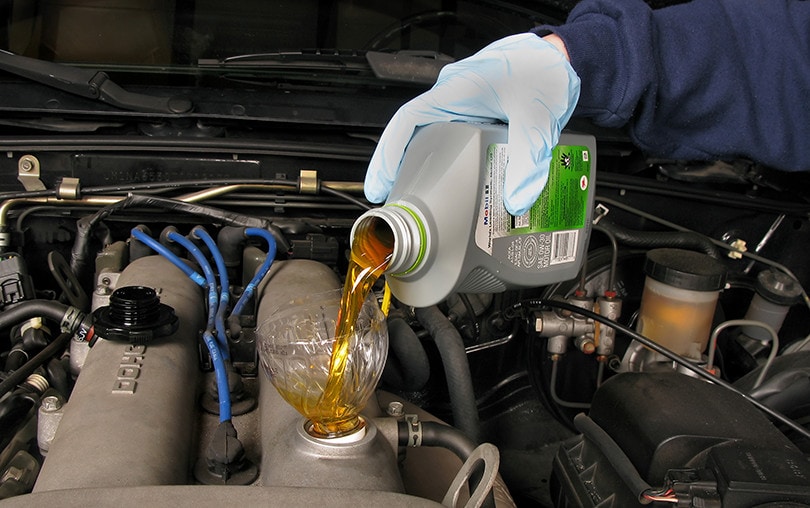A wonderful way to achieve automotive experience is to modify your personal oil. If your vehicle is not under warranty, changing the oil can be a single of your maximum routine maintenance charges, especially if you drive often or lengthy distances. You can help save labor and markup charges by carrying out it at property. Nonetheless, numerous distinct varieties of motor oils are available, and making use of the appropriate 1 for your vehicle is vital. If you want to change the oil in your automobile, keep reading through as we look at the different varieties of oil so you can discover out which a single is appropriate for you.
The 4 Different Types of Oil for Cars
1. Conventional Motor Oil
| Uses: | Light-duty, late model cars |
The motor oil is the most frequent, specifically in more mature vehicles. It’s a refined petroleum item with additives that aid it meet up with the demands of your engine. Typical motor oil was all around extended prior to the other varieties, and it’s usually the cheapest solution, but it includes impurities and tends to split down faster.
- Inexpensive
- Long history
- Breaks down sooner than most other varieties
2. Full Synthetic Motor Oil

| Uses: | High-performance engines |
Entire synthetic motor oil is a created oil that includes virtually no impurities. It helps boost gasoline mileage and can endure substantial and minimal temperatures much better than traditional motor oil. It also has a sturdy oxidation resistance and aids prevent oil sludge buildup. The downside to complete synthetic motor oil is that it is very high-priced — it can expense two to four moments as much as traditional motor oil.
- Improves gas mileage
- Withstands high and low temperatures well
- Extremely expensive
3. Synthetic Blend Motor Oil
| Uses: | Most vehicles |
Synthetic blend motor oil is just what it appears like: a mix of conventional and total artificial oils. The end result is an oil that can stand up to temperatures better than typical oil, with much less sludge buildup and oxidation at a reduce price than entirely artificial motor oil. While its protections are not as good as these of total artificial motor oil, it’s a very good center-of-the-road choice for numerous motor vehicle homeowners.
- Less expensive than full synthetic motor oil
- Improved protection over conventional motor oil
- Not as good as full synthetic motor oil
4. High-Mileage Motor Oil
| Uses: | Older vehicles |
As the identify implies, higher-mileage motor oil has a particular system for engines above seventy five,000 miles. This soil consists of additives that support situation the rubber seals in your motor to stop oil leaks. It also contains detergents to support thoroughly clean the engine and antioxidants to support it operate better. The downside of making use of this oil on newer engines is that you’re acquiring additives that you really do not need to have.
- Contains special detergents to clean the engines
- Conditions rubber seals in the engine to keep them from wearing out
- Expensive
- Not for newer engines
Most individuals constantly get their oil changed soon after a particular variety of miles, based on the sort and age of the automobile, how significantly you push the engine, and what type of oil you use. Most authorities recommend shifting your vehicle’s oil each and every 3,000 to five,000 miles. A mechanic will adjust the oil filter at the same time to keep the motor running in peak condition for as long as feasible.
What Kind of Oil Should I Use in My Car?
The kind of oil that you use in your vehicle will count on a number of aspects. Full artificial motor oil is often the ideal decision, but its substantial price may put it over funds for some people, and it’s not crucial except if you are towing or racing, each of which can set considerable pressure on the engine, demanding a greater oil. A artificial blend is the greatest selection for most people since the expense is a lot more realistic, and you get plenty of advantages generally supplied only to complete synthetic motor oil customers. If you have an older car with high mileage, you may contemplate making use of high-mileage oil to support problem the rubber gaskets and thoroughly clean the engine.
What If I Mixed Synthetic Oil With Conventional Oil?
Mixing oils will not damage your engine. If you accidentally blend entire artificial motor oil with conventional motor oil, you inadvertently produced artificial mix motor oil and it will not damage your automobile in any way. If you combine a synthetic mix with typical motor oil, the result will be a weaker synthetic blend that will also not harm your engine. The largest downside to mixing oils is that you by no means know how much synthetic oil is present to give further protection.
Summary
Even though numerous individuals even now use typical motor oil, they can boost motor efficiency by upgrading to a synthetic blend, which will reduce oxidation and oil breakdown and enable it to withstand high- and minimal-temperature changes much better. Full synthetic motor oil is expensive, but it is a very good option if you place a wonderful offer of strain on your vehicles by towing or driving rapidly. High-mileage oil can help you get a couple of far more miles out of your aged motor vehicle.
Showcased Image Credit: IamTimEre, Pixabay
Contents

